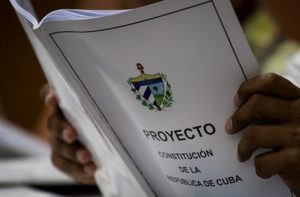 (OPINIÓN) A CONSTITUTIONAL REFORM THAT BEGINS THE TRANSITION IN CUBA.
(OPINIÓN) A CONSTITUTIONAL REFORM THAT BEGINS THE TRANSITION IN CUBA.
Cuba undertakes fundamental reforms in its 1976 Magna Carta. Faced with the opinion of those who lament “immobilism”, the island experiences a change of political, economic and social model. The draft Constitution approved in the National Assembly will be submitted to popular discussion and referendum.
The proposal recognizes the role of the market and private property, reorganizes the State to disperse powers. Communism is eliminated as an end and replaced with the reference to “a socialist, independent, prosperous and sustainable society”. The single party – Communist – is maintained as a political subject.
Although the predominance of the state enterprise and socialism is insisted on, other forms of property, forbidden in almost 60 years of revolution, are finally accepted. It is positive, although the concept that the state, mixed area and cooperatives are pillars of the model is still valid. In a decade, the “cuentapropistas” have come to represent 13% of the labor force.
Another aspect mentioned is the openness to foreign investment, which in different ways has come from the landing, for example, of European companies with investment in tourism and its infrastructure.
In social matters, years of homophobia would end with the marriage between “two people” (not man and woman, as up to now). Homosexuals were persecuted and subjected to reeducation.
For now, the lines set by former President Raul Castro will open the door to economic liberalization without loosening the reins of the political. There are those who consider the constitutional reform another maneuver to wash the face of the regime. A farce, in short. The reforms are seen as simple cosmetic changes that do not represent a democratic opening nor grant basic rights to Cubans.
Transitions are not usually simple. The president, Miguel Diaz-Canel, may be emancipating himself from the control of orthodoxy and the old guard. Necessarily with care and without precipitating events. Cuba is on the way to entering a new phase.
Doubts in the population.
However, the population maintains its doubts regarding the constitutional reform. As reported by Europa Press, the results of a survey conducted by the Study Group of Social Dynamics-Cuba of the Cuban Observatory of Human Rights shows that only 17.6% of Cubans believe that the reform of the Constitution will improve its quality of life. The majority of the respondents, 57.8% consider, in addition, that “the leading role of the Communist Party of Cuba” should be eliminated and 62.3% think that the new Magna Carta should allow the multi-party system.
However, the survey shows that the majority of the population does not rely to a large extent on the changes that may come from the Government now that Miguel Díaz-Canel has come to power. Among those under 30, 35.2% do not think it is possible for the situation to improve for Cubans in the future.
 (OPINIÓN) REFORMA CONSTITUCIONAL QUE INICIA LA TRANSICIÓN EN CUBA.
(OPINIÓN) REFORMA CONSTITUCIONAL QUE INICIA LA TRANSICIÓN EN CUBA.
Cuba emprende reformas fundamentales en su Carta Magna de 1976. Frente a la opinión de los que lamentan el “inmovilismo” la isla experimenta un cambio de modelo político, económico y social. El proyecto de Constitución aprobado en la Asamblea Nacional será sometido a discusión popular y referéndum.
La propuesta reconoce el papel del mercado y la propiedad privada, reorganiza el Estado para dispersar poderes. Se elimina el comunismo como fin y se sustituye con la referencia a “una sociedad socialista, independiente, próspera y sustentable”. Se mantiene el partido único -Comunista- como sujeto político.
Si bien se insiste en la preponderancia de la empresa estatal y el socialismo, otras formas de propiedad, vedadas en casi 60 años de revolución, finalmente son aceptadas. Es positivo, aunque sigue vigente el concepto de que el área estatal, mixta y las cooperativas son pilares del modelo. En una década, los “cuentapropistas” han llegado a representar el 13% de la fuerza laboral.
Otro aspecto mencionado es la apertura a la inversión extranjera, que de distintas formas ha llegado desde el desembarco, por ejemplo, de empresas europeas con inversión en turismo y su infraestructura.
En materia social, terminarían años de homofobia con el matrimonio entre “dos personas” (no hombre y mujer, como hasta ahora). Los homosexuales fueron perseguidos y sometidos a reeducación.
De momento seguirán las líneas fijadas por el expresidente Raúl Castro de abrir la puerta a la liberalización económica sin soltar las riendas de lo político. Hay quienes consideran la reforma constitucional una maniobra más para lavarle la cara al régimen. Una farsa, en resumen. Las reformas son vistas como simples cambios cosméticos que no representan una apertura democrática ni otorgan derechos básicos a los cubanos.
Las transiciones no suelen ser simples. El mandatario, Miguel Díaz-Canel, puede estar emancipándose del control de la ortodoxia y la vieja guardia. Necesariamente con tiento y sin precipitar acontecimientos. Cuba está en camino de entrar en una nueva fase.
Dudas en la población.
Con todo, la población mantiene sus dudas respecto a la reforma constitucional. Según informa Europa Press, Los resultados de una encuesta realizada por el Grupo de Estudio de las Dinámicas Sociales-Cuba del Observatorio Cubano de Derechos Humanos muestra que tan sólo el 17,6% de los cubanos considera que la reforma de la Constitución mejorará su calidad de vida. La mayoría de los encuestados, el 57,8% considera, además, que debería eliminarse “el papel rector del Partido Comunista de Cuba” y un 62,3% estima que la nueva Carta Magna debería permitir el multipartidismo.
No obstante, la encuesta muestra que la mayoría de la población no confía en gran medida en los cambios que puedan venir del Gobierno ahora que Miguel Díaz-Canel ha llegado al poder. Entre los menores de 30 años, un 35,2% no cree posible que la situación mejore para los cubanos de cara al futuro.
Agencies/ ElEconomista.es (Editorial)/ Internet Photos/ Arnoldo Varona/ TheCubanHistory.com
THE CUBAN HISTORY, HOLLYWOOD.








